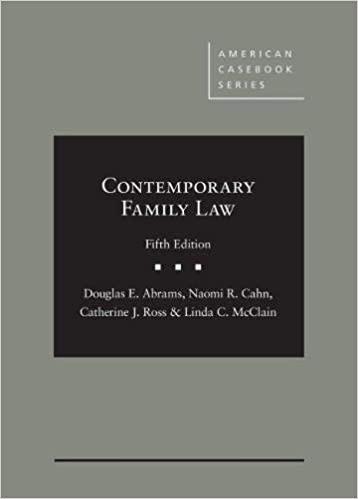Question
Maurice Lamont Davis and Andre Levon Glover committed a string of gas station robberies in Texas. The federal government charged both of them with multiple
Maurice Lamont Davis and Andre Levon Glover "committed a string of gas station robberies in Texas." The federal government charged both of them "with multiple counts of robbery affecting interstate commerce in violation of the Hobbs Act" under 18 U.S.C. 1951(a). They were also charged with "one count of conspiracy to commit Hobbs Act robbery." The jury found the defendants guilty on most of the counts. The federal government also charged the men under 924(c). Section 924(c)(1)(A) states:
. . . [A]ny person who, during and in relation to any crime of violence or drug trafficking crime . . . for which the person may be prosecuted in a court of the United States, uses or carries a firearm, or who, in furtherance of any such crime, possesses a firearm, shall, in addition to the punishment provided for such crime of violence or drug trafficking crime(i) be sentenced to a term of imprisonment of not less than 5 years; (ii) if the firearm is brandished, be sentenced to a term of imprisonment of not less than 7 years; and (iii) if the firearm is discharged, be sentenced to a term of imprisonment of not less than 10 years.
. . . [A]ny person who, during and in relation to any crime of violence or drug trafficking crime . . . for which the person may be prosecuted in a court of the United States, uses or carries a firearm, or who, in furtherance of any such crime, possesses a firearm, shall, in addition to the punishment provided for such crime of violence or drug trafficking crime(i) be sentenced to a term of imprisonment of not less than 5 years; (ii) if the firearm is brandished, be sentenced to a term of imprisonment of not less than 7 years; and (iii) if the firearm is discharged, be sentenced to a term of imprisonment of not less than 10 years.
Under the section certain weapons also trigger increased penalties. "[T]he government argued that Mr. Davis and Mr. Glover had each committed two separate 924(c) violations by brandishing a short-barreled shotgun in connection with their crimes." The jury agreed with the argument on the additional violations. "Adding the 924(c) mandatory minimums to its discretionary sentences for their other crimes, the district court ultimately sentenced Mr. Glover to more than 41 years in prison and Mr. Davis to more than 50 years."
Assume that Glover and Davis file an appeal in your court.
- In the U.S. legal system, courts can declare statutes unconstitutional if the statute is vague. Is 924(c)(3) unconstitutionally vague? How would you decide this case? Explain your answer.
- What problems does it cause when statutes are too vague? Explain your answer.
- If it is unconstitutionally vague, which branch of government is responsible for correcting it? Explain your answer.
Step by Step Solution
There are 3 Steps involved in it
Step: 1

Get Instant Access to Expert-Tailored Solutions
See step-by-step solutions with expert insights and AI powered tools for academic success
Step: 2

Step: 3

Ace Your Homework with AI
Get the answers you need in no time with our AI-driven, step-by-step assistance
Get Started


